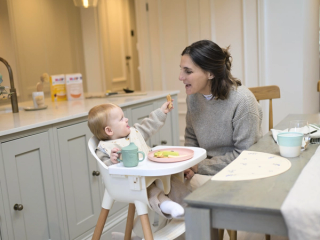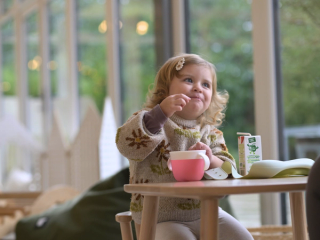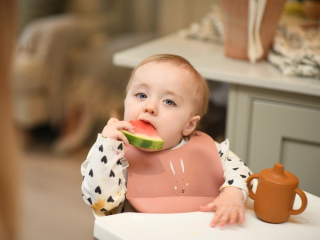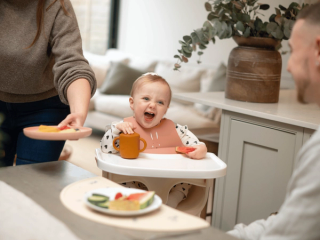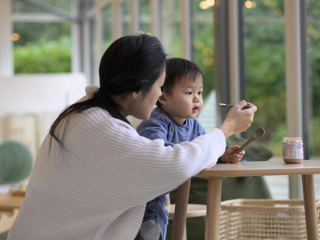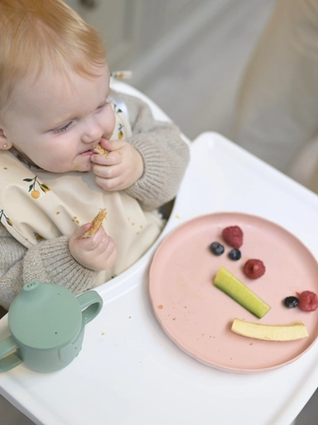
- Home
- Advice Hub
- Toddler
- Toddler Feeding
- Help Your Toddler Develop A Healthy Relationship With Food
How to help your toddler develop a healthy relationship with food
Learn tips to help your toddler build a positive relationship with food, encouraging healthy habits and fostering a love for nutritious meals.
Like most parents, you probably want your child to enjoy a healthy relationship with food, but figuring out how to do that can feel tricky. But before we get to that, we really need to have a think about what a healthy relationship really looks like. It may surprise you that it isn’t just about the food, it’s also about how we feel about ourselves too as the two are very closely connected.
A healthy relationship with food looks different for everyone but the core things to work towards are eating for hunger, eating until you are full, eating free from restrictions and guilt and feeling good about your body. This may all feel quite ‘adult’ but laying the foundations for these behaviours needs to start right from the beginning, creating childhood healthy eating that continues throughout life.
How can good nutrition contribute to my child’s health?
Healthy eating gets talked about a lot, sometimes it can feel like we are being bombarded with this message on all the various media we look at. We’re told we should be giving healthy food to our children, but we’re not always told why that is important.
Over the last couple of decades there has been more and more research highlighting that the first 1000 days of life, from conception through to toddlerhood are important for long term health. A nourishing diet throughout pregnancy and then from birth to the second birthday not only supports immediate growth and brain development but also has a profound impact on long-term health. Eating a good diet helps to build a strong immune system, supports healthy bone development, and reduces the risk of chronic conditions such as obesity, diabetes, and heart disease later in life. So, getting it right matters.
Top tips for introducing healthy eating habits
Developing healthy habits can’t really be taught, it is learnt as children when the adults around us lead by example and create the right environment.
1. Love your body
Firstly, talk positively about your body and other peoples and keep any negative talk away from little ears. Ideally, you shouldn’t be making negative comments about any body – all bodies are different and all bodies deserve respect. The more you believe it, the more likely it is your child will grow up believing it too.
2. Listen to your child’s cues
Let your child listen to their own fullness cues and eat to appetite. This is arguably one of the most important aspects of feeding children. Children who are allowed to stop eating when they are full, regardless of how much they have eaten, are more likely to grow into adults who listen to their body and stop when they are full. Children to regularly eat beyond fullness because an adult is saying ‘two more mouthfuls’ or ‘finish what is on the plate’ are less likely to listen to their fullness cues as they age and are more likely to overeat.
3. Have a routine around food
It is a good idea to have a good routine with food so that children know when food is coming and that food is not available at all times of day. Aiming for three meals a day and two snacks allows enough time for them to get hungry in between without getting so hungry that they start to experience negative emotions or behaviour. When children are allowed to eat whenever they want they may get used to eating because they are bored, or they may never properly experience hunger. That may sound extreme but there are many toddlers in society today who cannot really cope with hunger because they are fed so frequently throughout the day.
What types of food will help my child feel full?
It’s all very well being told that your child should have a good routine with food and not to give in to every food request, but that can be difficult if you worry that your child is genuinely hungry. Ensuring that all meals and snacks have a mix of carbohydrate, protein and healthy fats will help your child to feel satisfied and stop them asking for snacks ten minutes after they’ve eaten.
Offering whole grains like oats or wholegrain crackers with a protein such as cheese or natural yoghurt with some avocado or nut butter will keep your little one satisfied for longer than something like a biscuit or a piece of fruit on its own. It doesn’t have to be complicated, it can be a quarter of a ham sandwich and a little yoghurt. Provide foods that your child enjoys, and make sure there’s two or more food groups present.
How can I increase my toddler’s interest in food?
If your toddler is more interested in exploring than eating, or struggles to sit still at mealtimes, it can be frustrating. Their curiosity and need for independence often make it hard to keep them focused, especially when food isn’t grabbing their attention. Encouraging a stronger interest in meals can help, below are some suggestions to help:
- Sit and eat together ideally opposite each other at a table if you have one (but if you don’t, don’t worry, you can still sit together). Being present and engaging with them is more likely to keep their attention at the meal rather than away from it.
- Get them involved. You don’t have to spend hours cooking together, but including your little one in setting the table, serving themselves and getting them involved with some age appropriate tasks can really start to inspire them and spark an interest in food.
- Try to create an environment where food is the focus by turning off the TV or removing toys from the table. This can help your child to concentrate on eating rather than the distractions around them.
- Present food in an eye-catching way by using colourful plates and a variety of visually pleasing foods. You don’t need to spend hours making beautiful pictures, but different colours and textures can make all the difference.
Create healthy eating habits
Creating healthy habits is about the long haul; so making small consistent changes to the way you think about food and your relationship with your body. Over time, the little things you do each day will help your child turn from a headstrong toddler into an independent adolescent and then adult that makes good food choices and enjoys a positive relationship with food.
That said, even when you’re given helpful information it can be hard to put it into practice; especially if you have a fussy eater on your hands. But remember, it’s not about being perfect it’s about being kind to ourselves and doing the things we can when we can. Healthy eating for kids is possible, it just takes a little bit of consideration; if you feel like you need a bit of extra help you can read more about dealing with a fussy eater here.
